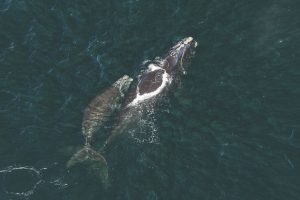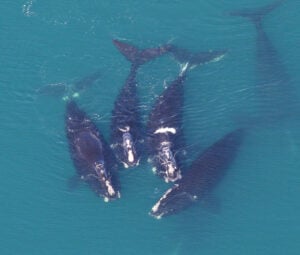
Wildlife
Punctuation’s mark: Can we save the critically endangered North Atlantic right whale?
After a series of mass deaths in recent years, what can we do?
- 4110 words
- 17 minutes
This article is over 5 years old and may contain outdated information.
Wildlife

Updated July 7
The whale’s body lies on the red sandy shore of Prince Edward Island, the blue skies above a stark contrast to the mood of the people clustered around the carcass.
“The first immediate reaction was disbelief: this can’t be happening,” says Tonya Wimmer, Director of the Marine Animal Response Society. “But once you start seeing the photographs, you can’t deny it.”
Experts from across Canada gathered in P.E.I. this past week to begin their investigation into the unprecedented deaths of six North Atlantic right whales in the span of just a few weeks. Led by Dr. Pierre-Yves Daoust, who works at the University of Prince Edward Island’s Atlantic Veterinary College, a team of biologists have now completed necropsies on three of the six whales.
Theories so far have been abound on the cause of the deaths, ranging from man-made injuries to water contamination to natural causes. Preliminary findings from the necropsies have been released and suggest two of the animals experienced some sort of blunt force trauma, while the third whale suffered from “chronic entanglement.”
Experts maintain that these findings are preliminary and that underlying problems which may have predisposed the animals to injury cannot be ruled out.
“Two to three weeks after an animal has died, there are lots of post-mortem changes,” says Daoust. “Whenever we make observations we have to be careful and discuss it among ourselves as vet pathologists first.”
Unprecedented situation
The first dead whale was spotted on June 6. Since then, six more carcasses have been discovered floating, all in the same area between the Magdalen Islands and Prince Edward Island. The seventh carcass was confirmed yesterday by the Marine Animal Response Society to be a previously unobserved male, and was found floating north of the Magdalen Islands.
The deaths are a major blow for the endangered species, whose current global population is estimated at just 500 individuals, according to the Department of Fisheries and Oceans Canada.
“This is a critically endangered species already and then you see three, then four, then five, then six of them? That alone has given everyone pause,” says Wimmer.
The floating carcasses are being monitored with GPS trackers and aerial photography. Samples of their blubber, muscle tissue and other material have been taken, but officials hope to bring at least one more whale to shore for a complete necropsy to determine cause of death. But that’s no easy feat with an animal that weighs, on average, 60 to 70 tons and is already decomposing.
“Getting their bodies towed to shore is hard; it has to be done slowly and carefully,” says Wimmer.
Over 40 people from various organizations have taken part in the necropsies. As the investigations continue, the team is hoping that no more whales turn up dead.
“We don’t know the full extent of the situation,” says Wimmer. “Hopefully everything that’s been found so far is the end of it.”
On July 5, a North Atlantic right whale was successfully freed by Fisheries and Oceans Canada after getting entangled from fishing gear close to the area where the other whales were found dead.
A final report on causes of death of the whales is expected within six to eight weeks.
Are you passionate about Canadian geography?
You can support Canadian Geographic in 3 ways:

Wildlife
After a series of mass deaths in recent years, what can we do?

Kids
The massive North Atlantic Right Whale is Canada's “true whale of the ice.” …

Wildlife
IUCN moves right whales to the second-last step before extinction on endangered species list

Wildlife
When one of the few remaining females of reproductive age in the southern resident population of North Pacific killer whales was found dead near Comox B.C. in 2014, an investigation was launched. The results highlight the challenges of protecting our most iconic marine mammals.